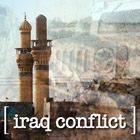
|
US, IRANIAN OFFICIALS MEET IN BAGHDAD TO DISCUSS SECURITY, STRATEGIC CONCERNS
HISTORIC MEETING SEES NO MAJOR BREAKTHROUGH, BUT COULD PAVE WAY FOR LONGTERM NEGOTIATION 29 May 2007 Diplomats from the US and Iran have met in direct talks for the first time in more than a quarter century. There was little anticipated to be gained from the meeting, except perhaps a premise for future security negotiations and a possible increase in mutual confidence in the goal of securing Iraq. The meeting was described by participants as "businesslike", Iran proposed a three-way forum to negotiate security solutions. The Iraqi government has expressed support for the trilateral security committee, specifying that no such negotiations or decisions should be considered legitimate without the participation and approval of the elected Iraqi government. Officials from both Teheran and Washington agreed the goal should be a free, democratic and peaceful Iraq which is not a threat to any of its neighbors. The Los Angeles Times described the meeting, held in Iraqi PM Nouri al-Maliki's Baghdad office, as "a reconfiguration of the Bush administration's stance toward Iran". The warming of relations was recommended by the Iraq Study Group report last year, as a necessary ingredient to establishing peace and security in Iraq, but was initially rejected by the White House as a dangerous shift in policy. But 2007 has seen a shift in administration views of the policy's potential, as officials "attended a neighbors' conference arranged by the Iraqi government in March at which Iran was also present, and Secretary of State Condoleezza Rice briefly exchanged pleasantries with her Iranian counterpart at a regional security meeting in Sharm el Sheik, Egypt earlier in May". Iran stated that the US presence in Iraq was legally an occupation and required concrete steps to provide peace and security. US representatives said they will be watching for a "change in Iranian behavior". The meeting comes only days after reports suggested US forces have been inside Iran for more than a year. The next step would logically be to expand negotiations and set up a further meeting, as suggested by PM al-Maliki. [s]
RELATED STORIES: The United States Senate has voted to impose a timeline for withdrawal from Iraq by March 2008. The move comes only days after the House voted to include a deadline for withdrawal in its war-funding legislation. The Senate has not yet passed the full funding bill, but it is unlikely the wording will now be altered or removed. [Full Story] HOUSE VOTES TO ORDER US TROOPS TO LEAVE IRAQ BY AUGUST 2008 Even as Pres. Bush has increased the troop "surge" to 28,000 additional soldiers in Baghdad, the US House today voted by simple majority to pass legislation requiring Bush to complete a "phased redeployment" of all combat personnel currently in Iraq by 2008. [Full Story] BUSH ANNOUNCES PLANS TO SEND 21,500 MORE SOLDIERS TO IRAQ After much speculation and many leaks, US pres. George W. Bush has announced he will send more than 20,000 additional soldiers into Iraq warzone, will require Iraqi government to take action against sectarian movements fomenting violence across Iraq. Bush also said that "Where mistakes have been made, the responsibility rests with me". [Full Story] SENATE REPORT SAYS HUSSEIN NEVER HAD AL-QAEDA TIES As the 5th anniversary of the attacks of 11 September 2001 approach, the US Senate's Intelligence Committee has issued a report officially finding that Saddam Hussein never collaborated with al-Qaeda in any sense. In fact, he was hunting Abu Musab al-Zarqawi, who would later name his organization "Al-Qaeda of Mesopotamia" or as per Pentagon briefings "Al-Qaeda in Iraq". [Full Story] DESPITE THOUSANDS OF CIVILIAN DEATHS, FEW MURDER CASES HAVE BEEN BROUGHT IN IRAQ WAR While prisoner abuse has been a widely reported charge, with shocking images and public outrage to keep attention on the subject, there has been relatively little similar public outrage expressed over situations where civilians have died in questionable circumstances. The Washington Post reports there has been a tendency not to investigate many such deaths, with top officials saying "in private" that there's "a tendency to consider Iraqi civilian deaths an unintended consequence of combat operations". [Full Story] MOST WANTED INSURGENT LEADER KILLED IN AIR-STRIKE Reports from Baghdad suggest Abu Musab al-Zarqawi was killed by a US airstrike on 7 June 2006. The official announcement was made by Iraq's prime minister Nouri al-Maliki, and was later confirmed by US Gen. Casey. The White House issued a statement of cautious relief, saying the removal of Zarqawi could be a moment of hope for Iraq, but will not end the ongoing sectarian and insurgent violence. [Full Story] NO WMD, JUSTIFICATIONS FOR WAR IN QUESTION David Kay, chief weapons inspector for the Iraq Survey Group, who recently left his post, reports there was no evidence to indicate the presence of any weapons of mass destruction, any stockpiles, or any competent programs to develop such weapons. Kay said evidence was found that indicated there had been programs in the past, but that it appeared that all the weapons had been destroyed, and that the programs were in disarray, and no production facilities existed. [Full Story] |
||||||||||
|
|||||||||||







